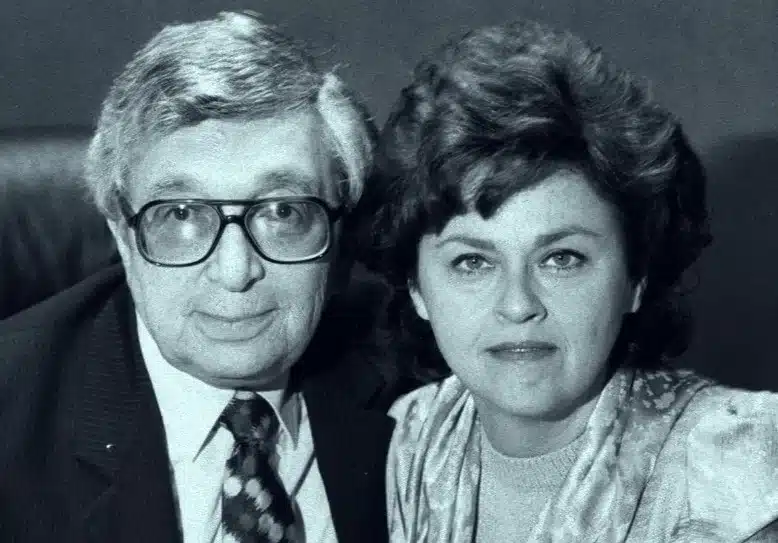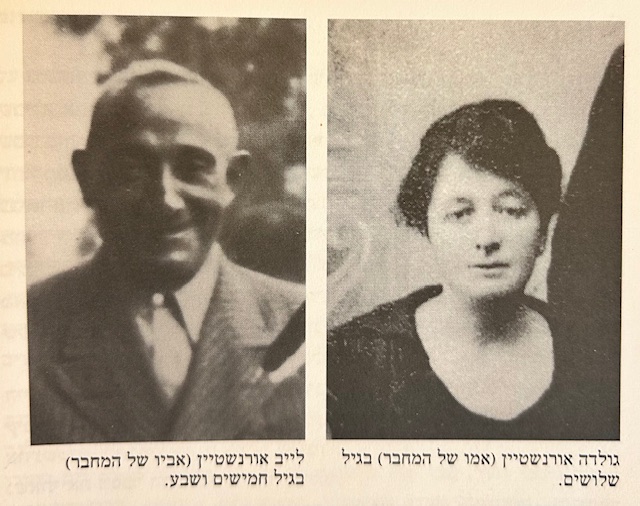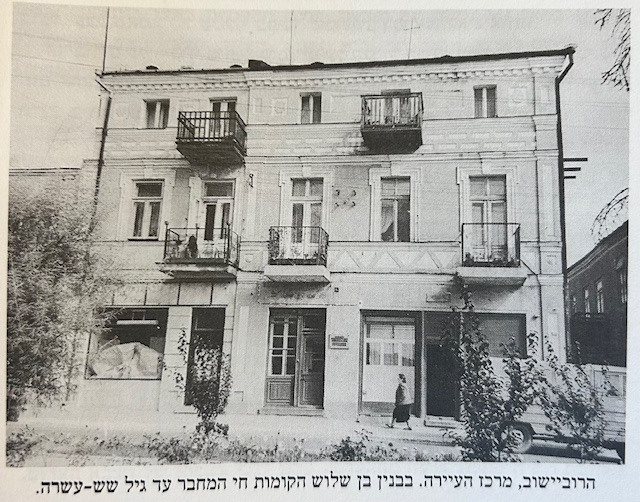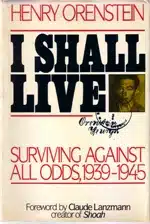Home » Orenstein Henry
Henry Orenstein was born on October 13, 1923, in the town of Hrubieszow to his parents, Leib and Golda Orenstein. Henry had three older brothers Fred, Felix, and Sam and an older brother and a younger sister Hanka. His father was a grain merchant and one of the wealthiest men in the town.
Henry, who could already read by the age of 4, refused to attend primary school and studied with private tutors. At the age of 11, he joined the school and became an outstanding student, but this did not protect him from confrontations with antisemitic Polish children, which caused him anxiety and fear.
The gymnasium (high school) was a prestigious school, with admission requirements that were extremely challenging and nearly impossible for Jewish students. Out of 500 applicants, only about 30 were accepted, including Henry and his best friend Isaac, who excelled academically and were the only Jewish students admitted in that cohort.
Despite his academic excellence and being a top performer, when the time came to award prizes to outstanding students, the gymnasium, as part of its antisemitic policies, decided not to give awards to Jewish students.
In 1938, with the rise of Hitler’s power in Europe, the spread of “racial theories,” and the intensification of antisemitism, Henry predicted that the Germans would invade Poland and kill the Jews. He tried to persuade his parents to leave. The adults, fearful of what lay ahead, could not believe things could become so dire and hoped solutions would be found.
For Henry, who described himself as a fortunate child, his childhood dreams shattered when he turned 16 in 1939, shortly after the Nazi invasion of Poland. It was clear to him that this was no ordinary war and that there was a significant danger to the fate of Jews in Poland.
In September 1939, the Germans advanced towards Poland, and the Russian resistance failed to stop them. Despite the hope that Hitler’s threats were empty and that the dark prophecies would be disproved, fear was heavy. The armies of France and England joined the war, but Hitler’s achievements quickly became known, and rumors of his horrific actions against Jews caused widespread panic.
Amid the growing wave of refugees each day, the Orenstein family decided to move to the area under Russian control. However, after staying outside the city and hearing rumors that the Russians had reached Hrubieszow, the family returned home. Soon, new rumors spread, this time about the Russians’ anticipated retreat and the German takeover of the city. Once again, there was hesitation about what to do to survive.
At the end of September, the Orenstein family decided that Henry, his father, and his three brothers (Fred, Sam, and Felix) would flee to a Soviet-occupied area, to one of the towns in Ukraine, while his mother and sister Hanka would stay at home, naively believing the Germans would not harm women.
Even under Russian rule, life was not easy, but Henry integrated into school and excelled in his studies, and the family managed to live for several months in the city of Olyka, which they found to be a relatively safe place. Horrific rumors about the death marches for the Jews of Chełm and Hrubieszow reached them, as well as news of the heavy taxes imposed on Jews, which impoverished the community.
In June 1941, the Germans arrived in Olyka and took Jews “to labor.” Initially, the execution of Jews for no reason was met with complete disbelief, but over time, the magnitude of the cruelty became clear. The Orenstein men continued their escape to the city of Volodymyr, as reports of mass murders came from all directions.
In Volodymyr, Henry and his family hid in a narrow space between two walls, living in horrific conditions. The Germans advanced on all fronts, encircled Leningrad, and reached Kiev. It seemed that all of Europe had fallen at their feet yet hope stirred when it became known that the German forces were halted in Russia and struggled to advance in the harsh winter.
Rumors began circulating about the gassing of Jews in gas vans by the S.S and gas chambers-death factories in cities like Treblinka, Sobibor, and Auschwitz. It was inconceivable how the world stood by and allowed such atrocities to occur. In city after city, the Germans gathered Jews and deported them to death camps.
The family hid with Mrs. Lipińska, whose son Henry had previously taught. They knew that anyone caught hiding Jews would pay with their life and their family’s lives. Mrs. Lipińska provided them with food and helped them cross the Bug River to reunite with the women of the family in Hrubieszow after three years of separation.
On the morning of October 20th 1942, Jews were ordered to appear at the train station , and about 3,000 of the town’s residents were taken to Sobibor, where they met their death. Henry and his family remained in hiding. The sight of Jews being led away and Poles harassing them was heartbreaking. Henry immersed himself in reading to escape the horrifying reality.
During the final Aktion (mass murder) in 1942, as the Hrubieszow ghetto was liquidated, thousands of Jews were sent to the gas chambers in Sobibor. The S.S, with their dogs and Ukrainian collaborators, “hunted” for Jews in their homes. During this time, the Orenstein family hid in a neighbor’s house, by squeezing into a narrow hiding space between two walls, unable to move or sit, for about seven days. Eventually, hunger forced them to surrender to the Nazis.
Due to Fred’s acquaintance with a German soldier, the Orenstein brothers were granted “clemency” and were not sent to their deaths. However, their parents, Leib and Golda, were taken on trucks, with their mother calling out in Yiddish, “Fred, save the children.” The trucks took Hrubieszow’s Jews to the Jewish cemetery in the city, where they were ordered to undress and lie in a row at the edge of a pit, as a Gestapo officer shot each one in the head. The bodies were thrown into the pit and burned.
News began to arrive about Montgomery’s victory in the desert at El- Alamein, the American landing in North Africa, and later reports from the Russian front, where the Germans failed to advance and suffered significant defeats.
During this time, Henry, his brothers, and a few other Jews were assigned to clear out the homes of murdered Jews. It was clear they were living on borrowed time. Over time, Fred, who was respected even by the Germans due to his role as a doctor, was appointed head of their group. As such, he received orders from the Gestapo and was responsible for administrative tasks.
The group of Jews, including Henry, his brothers, and his sister, were transferred to the Budżyn camp. Until the last moment, it was unclear whether they were being taken for extermination or labor. At the entrance to the camp, the infamous sign “Arbeit Macht Frei” (“Work Sets You Free”) greeted them. The people they encountered there were in horrific physical condition, slowly wasting away.
The camp inmates spoke of a sadistic commander, and life in the camp was harsh. They subsisted on thin soup and suffered from hunger. Thanks to their having several gold coins that the Orenstein brothers managed to hide, they occasionally obtained bread. In this camp, they began working for the Heinkel factory, producing airplane parts for the German army. They believed that work in the factory, which was of military value to the Germans, might offer them some protection from death selection.
As foreign armies advanced, reports arrived of labor camps where Jews were systematically exterminated. It became evident that the Germans would not want witnesses to their crimes and would act to kill everyone. Rumors suggested that the factory owners at Heinkel pressured the authorities not to eliminate the camp inmates, as they needed labor for the factory. Despite this, it was clear that as Allied and Russian forces pressed the Germans, the lives of Jewish prisoners were in ever-increasing danger.
One day he heard an announcement: “All Jewish scientists, engineers, inventors, chemists, and mathematicians must register immediately.” None of the family members belonged to these professions, Fred was a doctor, Sam a lawyer, Felix had studied medicine for two years, and Hanka and Henry were merely high school students. Henry feared the worst but thought that inclusion in this group might save their lives. Without consulting his brothers, he registered them all.
When those who had registered for the “scientists” group were called, Henry was uncertain about the group’s purpose. Gradually, it became clear that this might be a group of “pseudo-scientists” whose only function was to exempt German officers from front-line duty while simultaneously providing a pretext to assist Jews.
The group was transferred to a nearby camp with improved conditions. However, shortly afterward, some members of the “scientists” group, including Hanka, were separated and loaded onto a truck. Onboard was also Hela First from Hrubieszow, who later recounted to survivors what happened to their families in Hrubieszow.
The truck stopped at the infamous Majdanek extermination camp, where only political prisoners remained after the Jews there had been murdered. It seemed no one understood the purpose of a unit of Jews at this place or how they had managed to survive. From the camp inmates, they learned that the average lifespan of a prisoner there was no more than three months and that over 100,000 Jews had perished in the camp before the last horrific massacre.
The final massacre in Majdanek took place in November 1943 and lasted 13 hours, during which 18,000 Jews were forced into trenches and murdered as waltz music played in the background. Political prisoners were ordered to search the corpses for valuables, burn the bodies, extract gold teeth, and sift through the ashes and bones in search of precious stones and gold. Clearing the bodies continued until just days before Christmas in 1943. The grounds were leveled to conceal the atrocities committed there.
The prisoners in the camp underwent humiliating physical inspections. Henry and his brother managed to hide money in their rectums, knowing that this money could save them later. Hiding money was extremely risky. Anyone caught with money or valuables was executed.
The Jews in Henry’s group were transported in freight trains. The destination was unknown, but Henry thought that any place was better than Majdanek. The trains were dark, suffocating, and hot. People relieved themselves inside; there was no room to move, and many suffocated or cried for help that never came. Eventually, they arrived at a camp in Poland called “Plaszow.”
At the camp, they were exhausted, filthy, and some had contracted Typhus. Luckily, under Fred’s supervision, the spread of the disease was contained.
Despite rumors about the Russians advancing into Poland, the prisoners knew they were marked for death and did not believe they would live to see the victory of the Russians or the Allies. In the camp, a group of Jews known as Kapos (collaborators with the Germans) lived in luxury and were corruped. Jews who had money could trade and buy goods from the Kapos.
Henry and his brother were assigned to construction work, building a hospital for the German army. During the construction, Henry found a newspaper scrap in a pit. He picked it up and put it in his pocket, but an S.S officer who saw him ordered him into the pit eight times, pointing a gun at his head, and pushed him back each time. Henry was sure his end had come. Eventually, the officer left him, battered and bruised.
At the beginning of May, an officer named “Dr. Blanka,” dressed in a white fur coat, arrived. He ordered the Jewish prisoners, about 20,000 people, to undress, ran them in the cold, and conducted a selection of who would live and who would die. Around 1,500 prisoners were sent to their deaths. Among those who survived, some requested to join the group being executed, as it included their loved ones. The Germans gladly complied.
When the construction work was completed, the prisoners were reassigned to fieldwork. In early June 1944, news arrived about the Allied landing in France, which brought renewed hope-and fear for the lives.
In June, all members of the “scientists” group were summoned for interviews. There was a concern that the questioning would reveal they were not actual scientists, as they had claimed. However, it quickly became clear that the professors heading the unit were not interested in testing the prisoners’ skills. The group was divided based on their claimed expertise-mathematicians, chemists, engineers, and inventors. The work assigned to them was trivial and meaningless, confirming Henry’s suspicion that the unit was merely a pretense for the professors to avoid conscription into the army.
Although the work was dull, it was relatively comfortable, providing security and shelter from harsh weather conditions. News of the American landing in Normandy, the German retreat in France, and the destruction of German factories encouraged the prisoners. At the same time, reports of an assassination attempt on Hitler heightened fears that he would retaliate against the Jews.
Fred was caught with money, endangering both him and Henry, who stepped in to save him. Sam and Felix, believing it was the end for Fred and Henry, despaired, knowing the war was nearing its end but fearing that Fred and Henry would not live to see victory.
Fred and Henry were summoned for interrogation by the camp commander. They refused to admit to hiding money and were severely beaten until they lost consciousness. When they did not break, they were sent to “standing cells”-torture chambers where prisoners were forced to stand in cramped, foul-smelling cells. They stood there for three days and nights, parched, without food or water.
Henry and Fred were transferred to the “punishment unit,” with the camp commander explaining that he was awaiting approval from Berlin to execute them. Meanwhile, they were returned to the “specialists” unit. Part of the group, including Henry and Sam were marched to an execution site, believing it was their final day. To their surprise, they were ordered to dig up mass graves, retrieve the bodies, and scatter them to conceal the scale of the killings.
Several Jews, including Felx and Fred, were separated from the group and remained in the camp. Henry, Sam, and others were transported to Berlin and then to the Ravensbrück camp.
In October 1944, the professor in charge of the mathematics unit arrived with calculating machines, and the group resumed their peculiar work. One day, the Jews were summoned, loaded onto trains, and transported to a notorious camp called Oranienburg-Sachsenhausen. Fortunately, the professor found them again, providing them with light indoor work, effectively saving their lives once more.
The sounds of Russian artillery in Berlin grew louder. Prisoners were ordered to assemble by nationality. Sam and Henry removed their yellow Star of David badges, leaving only the red political prisoner patch, and joined the Polish column. As they marched, Henry vowed to himself, “I shall not die, but live, and recount these deeds.”
The S.S pushed the weak, starving prisoners dressed in striped uniforms. Many collapsed, and those who did were shot in the head. After about seven days of marching, during which approximately 700 were killed, Sam weakened, and despair returned. Suddenly, Red Cross trucks appeared, distributing food packages to the starving prisoners-a miracle. The march continued, and so did the killing of the weak.
One morning, the prisoners awoke to find the guards had vanished. They discovered abandoned German trucks filled with food, which they unloaded to relieve their hunger. To their surprise, the liberation came from the Allies, not the Russians as they had thought. In a nearby town, Rostock, they saw disheartened German soldiers aimlessly wandering. Allied French soldiers directed them to a shelter for liberated prisoners, where they met other Jewish refugees freed from the camps.
In the displaced persons camp, food was abundant, but many prisoners died from illnesses, particularly typhus, or even overeating. Local Germans and soldiers suddenly claimed they had never supported the Nazis, but some of the displaced persons began taking revenge on Germans.
Henry and Sam decided to try to return to Hrubieszow to learn the fate of their family. Since Warsaw was destroyed and rumors suggested Jews were still in Łódź, they traveled there and met a relative who informed them that all the women deported from Hrubieszow, including their sister Hanka, were murdered. He described the death march in January 1945, where women were driven toward the Baltic Sea in freezing conditions, shot if they weakened, and ultimately pushed into the icy sea to drown.
In Hamburg, Henry found Fred, who informed him that Felix had been killed in the war’s final days. When they reached Hrubieszow, Henry discovered that only five Jews had survived from the once-thriving community. The local Poles had seized Jewish property and feared the survivors would demand their homes back. A Polish acquaintance warned them that locals occupying their house were planning to kill them. Henry and Sam quickly left for Łódź.
Henry was determined to emigrate to America, while Sam, a lawyer, doubted he could find work abroad. On his way to Hamburg, Henry passed through Czechoslovakia and met Chaim Silberstein, who was heading back to Poland. Henry warned him against returning to Hrubieszow, and Chaim, following his advice, returned to the displaced persons camp in Germany. Days later, Chaim was reunited with his brother Abraham, who had served in the British army and had been searching for Chaim in camps where liberated prisoners stayed.
After waiting nearly two years in displaced persons camps, Henry and Fred received immigration documents for the U.S. On October 2, 1947, they arrived in New York, where they were welcomed by Morris Orenstein and Adele, a woman Henry had met earlier. Henry and Adele got married. Henry learned English and started working for a fabric manufacturer. Eventually, he became a business partner with his uncle Morris.
In 1956, Henry and Adele had a daughter, Annette, and in 1958, a son, Mark. Henry and Adele later divorced, and Henry remarried Susie, who became his lifelong partner. Together, they engaged in extensive philanthropic work in the U.S. and Israel.
Henry Orenstein arrived in the United States in 1947 and began his career as a salesperson. Eventually, he decided to try manufacturing affordable dolls, quickly becoming an inventor and toy manufacturer. His primary focus was creating replicas of expensive dolls sold in department stores.
In the 1950s, Henry founded “Topper Toys,” a company that produced highly popular toys in the United States. These included dolls such as Dolly Surprise and Suzy Cute, as well as toy cars like Johnny Lightning. Over the years, Henry registered approximately 100 patents.
At a toy exhibition, Henry noticed unique toys made in Japan that transformed from vehicles into robots-the” Transformers”. In 1983, Henry traveled to Japan to Takara Toy Company to acquire the rights to distribute the Transformers. He approached the American toy company Hasbro and convinced them to produce the Transformers, which have remained popular toys to this day.
As an accomplished poker player, Henry realized that the game bored television audiences because they could not see the players’ cards. He invented another patent that revolutionized poker: he designed “windows” in the poker tables, allowing a camera to film the cards and relay them to television audiences. This innovation transformed the viewing experience of poker, significantly increasing the game’s popularity on television. Henry also became a producer of televised poker tournaments.
Henry and Susie Orenstein were actively involved in charity work in both the United States and Israel. Early on, they supported elderly individuals in need in the U.S. and funded the construction of an 11-story building in Manhattan for disadvantaged families, named the “Leib and Golda Orenstein” building in memory of Henry’s parents.
In Queens, New York, they established a soup kitchen designed to resemble a restaurant.
Henry also contributed to the creation of two memorials for the Jewish community of Hrubieszow: one in the Nachalat Yitzchak Cemetery in Israel and another at the Jewish cemetery in Hrubieszow, Poland, where many town residents, including his parents, were massacred. The memorials were designed by Abraham Silberstein, Henry’s close friend and a fellow Hrubieszow native who lost most of his family in the Holocaust.
In Kiryat Ono, Israel, Henry and Susie established the Orenstein House in memory of Henry’s parents. This facility serves as a sheltered housing complex for Holocaust survivors.
In 2015, Henry and Susie Orenstein donated funds to renovate the Loewenstein Rehabilitation Hospital, specializing in the rehabilitation of accident and war victims.
In 2017, Henry and Susie asked their Israeli friends, Sarah and Abraham Silberstein, to lead a project aimed at providing food for those in need. Their daughter, Yonit Raviv-Silberstein, founded an organization named “The Orenstein Project,” which supports Holocaust survivors and at-risk youth.



